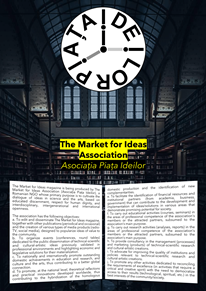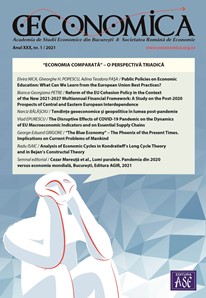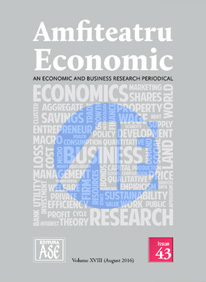
The Clawback Tax, Sponsor of Government Programs in Romania
The budget allocated to healthcare in Romania suffers from “chronic subsidization”. Politicians chose, as a long-term treatment for this issue, a tax that reduces the profits of drug manufacturers to the point of non-existence. These entities risk turning from profit-making businesses into virtual nonprofit entities. Through an objective and simple analysis, I will show how, through this tax which aims to ensure the necessary subsidized medication, and as a result of the declaration of pharma companies as public utilities, patients will have to spend more money on medicine. This goes against the stated intention of the ministry and ensures that Romania will always be on the cusp of a crisis of supply in pharmaceutical products.
Where to and where from?
In order to support state budgets allocated to subsidies for the drugs needed in the medical system, countries such as Portugal, Ireland, the UK, the Netherlands, France, Belgium, Hungary and Poland decided to implement a clawback system, which requires drug manufacturers or their authorized distributors must support the public health system through contributions proportional to the income garnered from publicly insured drug consumption. In Europe, this tax is known as a clawback mechanism, which assumes that the garnished amounts are funneled through the beneficiary back into the health system.
Romania adopted the mechanism applied in the Member States of the European Union and imposed on pharma producers, by way of the authorized distributors of their drugs in Romania, the obligation to pay a quarterly contribution. This started in 2009, when the budget for subsidized medication was exceeded, which made it impossible to provide the necessary medical treatments. Considering that this could greatly affect patients' health, having an irreversible impact on their lives, state authorities acted to ensure continued access of the population to medicine by urgently supplementing the public health fund through legislative intervention in the form of OUG (emergency government ordinance) no. 104/2009.
Although the term “clawback” is not referred to as such in the legislative text, the contribution is known as the “clawback tax”. This requires, according to OUG No.77 / 2011, the payment of quarterly contributions related to pharmaceutical products covered by national health programs and the costs of which are settled by the National Social Health Insurance Fund (FNUASS) to finance certain healthcare expenditures. All marketing authorization holders are obliged to pay these contributions.
The tax is calculated individually, per drug, depending on the volume of sales of the targeted product as a percentage of the total amount that exceeded the allocated budget, the shortfall which is intended to be covered by the quarterly contribution. In fact, this charge entails the return by the drug manufacturers of the sums that they have received for drugs sold on a quarterly basis that cannot be covered by the allocated budget.[[1]]
The clawback tax – the knock-out effect on the entire pharmaceutical industry
The results of the clawback tax are not limited to covering the drug spending shortfall with contributions paid by drug manufacturers, and this creates a "domino" effect with broad implications. Although an important source of income for the state, this tax is an outsized burden on those it targets, but also a danger to patients in the end. I will present an analysis of the facts and data available for the pharmaceutical field in Romania up to the year 2018 to show the impact of the imposition of this tax and what the consequences may be.
The aggressive increase of the clawback tax, worth several percentage points each year, due to the government's inability to cover its assumed expenses, will eventually lead producers of certain drugs to owe up to 40% of their turnover in tax. The tax increase from 18.89% (fourth quarter, 2016) to 23.45% (fourth quarter, 2017) shows that drug manufacturers are being forced to finance the budget deficit on drug spending.
From 2011 to 2018, in Romania, the budget allocated to drug payment remained at a constant level of RON 6 billion, but the consumption is expected to reach 10 billion, the difference being covered by the drug manufacturers. With the uncertainty in spending increases, the level of the tax is difficult to predict, further jeopardizing investment, since the development of any industry is slowed down by perennial uncertainties.
Over the years, no government has been able to solve the clawback tax issue, endangering the availability of medicine for patients and destroying an entire economic segment. The Romanian Industrial Manufacturers Association (PRIMER), warns that at this rate, there is a risk that, within a short timeframe, 1-2 years, Romanian factories will dial down their activity, and new investors will not appear, which would aggravate the problems already existing with the supply.
For example, investment intentions in new production units from Terapia and Alvogen have been halted due to the clawback tax and its unpredictability.[[2]] Applying the clawback rax at this rate will, according to APMGR (the Romanian Association of Generic Medication Producers) warnings, lead to the disappearance of commonly used medications such as antibiotics or pills that help patients suffering from serious illnesses such as cancer or leukemia.

Ensuring supply all the way to elimination
According to drug manufacturers, if drugs with prices below 25 lei are not exempted from the clawback tax, the industry will break down, since it is not profitable at a level of 40% tax on turnover. The disappearance of this drug category on the market would greatly affect patients, since they are used by approximately 8 million Romanians who, in their absence, would have to pay much more money to individually buy more expensive medicine.
There is, therefore, the risk that the drug manufacturers will abandon the under 25 lei market segment, which will lead to their disappearance from pharmacy shelves. Drugs that have become unprofitable due to the high clawback tax include drugs of critical importance used in the treatment of neurological, gastrointestinal, cardiovascular diseases, as well as cancer. This would be the result of the uniform application of the tax, irrespective of the selling price of the medicines.
Among the medicines that would be removed from the market unless another mode of taxation is introduced, which discriminates on price, we find: Indapamide (cardiovascular disease), Furosemide (liver cirrhosis, heart failure), Captopril (heart failure, hypertension), Bleomycin (hematological diseases, leukemia), Ranitidine (gastrointestinal disorders), Tamoxifen (breast tumors), Gentamicinum (intra-hospital infection), Cisplatin (cancer), Theophylline (asthma), Memantine, Flutamide.
The clawback tax is calculated based on the price of the drug including the surcharges of pharmacies and distributors. While these additions are constant for drugs priced over 300 lei, for lower-priced medicines the tax impact is much higher overall. For medicines with prices above 300 lei, the tax represents 24% of the producer's price point, while for medicines under 25 lei it reaches 34% of the producer's price point.
Within just 2 years of a 50% increase in the tax, approximately 10% of medicines costing less than 25 lei has disappeared from the market. The data presented in the table shows that, instead of providing patients with access to medicine, it makes it more difficult for them to buy them, forcing them to pay more for more expensive medicines, which also affects the health budget, which will have to cover the increased costs.
Trimester | III, 2015 | III, 2016 | III, 2017 |
The value of the clawback tax | 12.35% | 14.91% | 19.42% |
The number of drugs under 25 lei | 2166 | 2068 | 2001 |
I note that, at the same time as the clawback tax has increased since 2015, the number of drugs for various diseases under 25 lei available to patients has declined and continues to decline. Also, around 75% of all medicines with prices below 25 lei are produced in the country, which means that this tax implicitly affects the domestic production of Romania.
PRIMER has asked the Government of Mihai Tudose repeatedly to consider the tax exemption of drugs under 25 lei in order to avoid a drug crisis. [[3]]
The immunoglobulin crisis – the attack of drug manufacturers or the blame-avoidance of politicians?
Against the backdrop of the unpredictable rise of the clawback tax, Romania faced a serious and long-term crisis of immunoglobulin, which was no longer available to patients, and the manufacturer decided to withdraw from the market. Many voices have argued that this crisis was caused by the clawback tax and just as many accused the drug manufacturers. As a result of the scandal caused by the lack of immunoglobulin, which resulted in several avoidable deaths, the major drug manufacturers were harshly criticized, being considered guilty of deliberately provoking health system crises by deciding to withdraw certain drugs from the market and thereby force the hand of the Government through public outcry in the matter of waiving the clawback tax. [[4]]
In order to stem the crisis, the Government decided, starting from January 1st, 2018, also by emergency ordinance, to suspend for two years the obligation of companies producing human blood derivatives or plasma to pay the clawback tax contribution. The Ministry of Health argued that the tax exemption decision aimed to ensure the permanent availability of these vital drugs in order to avoid a repeat of another such crisis that would have a direct negative impact on public health. [[5]]
The decision of the Ministry was severely criticized in the belief that this created a precedent to be abused by drug manufacturers for future concessions. Critics have said that this could lead to the exemption from taxes of other medicines, which would mean a disaster if the other producers would have to bear the entire amount or if the burden of bearing the difference would be left to the state.
Most political decision-makers believe that the clawback tax is the only way to be able to bear the costs of providing subsidized drugs, since it brings in huge amounts to the state budget. They believe that manufacturers and drug distributors have used the crisis caused by the lack of immunoglobulin as a pretext to obtain clawback tax concessions. We should notice how the government's inability to support public health spending is the fault of the drug manufacturers, which in the eyes of political decision-makers are responsible for sustaining deficits. In fact, the clawback tax, which the suppliers of medicine bear and try to lobby for concessions, is the overrun or deficit of the budget allocated quarterly for "compensated" medical products for the public health system, theoretically borne by the FNUASS and the Ministry of Health budget.
If the trend towards increase of this tax is not halted, it would practically mean a gradual confiscation of income, and. in this situation, what would be the difference between licit companies and the companies/persons performing illicit activities and which have their income confiscated as a sanction? In an objective analysis, we find that the profits of the producers are heavily affected and, in some cases, completely foregone. Acceptance by the producers of this situation would mean their acceptance of giving up their main purpose, namely to carry out a profit-making economic activity. They cannot be blamed for the effects of the crisis, because their purpose is to satisfy the demand in order to achieve profit, not to ensure the social protection of patients in Romania. I consider this crisis as an example of revenue redistribution, in which all the parties involved are affected in order to achieve the objectives set by the state.
The hypothesis of future crises of other drug supplies is indeed very probable, but it is not the producers who are responsible for them, but the authorities, especially since, before withdrawing from the market, a manufacturer/distributor of drugs has to fulfill a set of formalities, including a prior notice of intention to leave the market, which would allow the authorities time to take action accordingly and to avoid a possible crisis.
Therefore, the deaths caused by the immunoglobulin crisis cannot be attributed to drug manufacturers, all the more so as they have not assumed the responsibility of ensuring that patients have permanent access to medicines regardless of market conditions but have the responsibility to be profitable. We can say that the state is directly responsible for ensuring the availability of medication, a responsibility assumed through the allocated budgets.
In conclusion, the immunoglobulin crisis was formed in the context of a permanent sub-financing of the public health system, a fact known to all governmental officials but unrecognized by them.
Balance sheet and forecast
Following the rapid rise in the clawback tax, drug manufacturers have been severely affected by the implementation of a fiscal policy that could violate the principle of profitability, a basic principle of economic activity. At the same time, it is visible that the tax also had a negative impact on patients who were supposed to have been afforded better access to drugs, with the opposite occurring in certain instances.
The tax itself is not necessarily the problem, but rather the high level at which it is set. Also, the way it is calculated, based on the volume of the proceeds, not on the net profits, makes it strongly affect the profit of the pharmaceutical companies, which ultimately directly affects consumers.
The negative impact that the high level of this tax may have is also evidenced by the immunoglobulin crisis in Romania in 2017. Also, the companies in the field and the related civil society groups and industry groups have convincingly argued that the drug manufacturers are not the cause of the immunoglobulin crisis or of other future crises, but they are a victim, along with patients, of this tax. The accusations levelled against them by the authorities are unjustified. All the more so since there were attempts to establish a dialogue with the competent authorities to reach a consensus with them, which had no effect.
If the level of tax will not decrease in the future, there is a risk that the immunoglobulin crisis will not be a lone case. Manufacturers and distributors of medicines might decide to withdraw from the market in Romania unhappy with their profit, which could lead to a generalized drug crisis in the country.
Photo credit: pxhere.com.
Notes:
[1] Constantin, R.C. Evoluția juridică a taxei clawback din perspectiva modificărilor legislative a prevederilor O.U.G. nr. 77/2011. Alianța pacienților cronici din România. Disponibil la: https://aliantapacientilor.ro/wp-content/uploads/2016/01/Articol-Robert-NICULAE.pdf.
[2] Mihalache, G., Producătorii de medicamente generice se plâng de taxa clawback. Ziarul Finainciar, 23 mai 2018 (http://www.zf.ro/companii/producatorii-de-medicamente-generice-se-plang-de-taxa-clawback-au-fost-intentii-de-investitii-din-partea-alvogen-si-terapia-dar-care-au-fost-stopate-din-cauza-taxei-clawback-si-a-impredictibilitatii-17226182).
[3] Buican, A. PRIMER avertizează: România rămâne fără medicamente din producție intern. Capital, 12 iunie 2018 (https://www.capital.ro/patronatul-producatorilor-industriali-de-medicamente-avertizeaza.html).
[4] Andronic, D. ȘANTAJ LA GUVERN. Morți contra taxa de clawback!. Evenimentul Zilei, 7 decembrie 2017 (http://evz.ro/santaj-la-guvern-taxa-clawback.html).
[5] Ministerul Sănătății, 14 decembrie 2017. Ordonanță de urgență de suspendare temporară, a obligației de plată a taxei de clawback pentru deținătorii autorizațiilor de punere pe piață a medicamentelor derivate din sânge uman sau plasmă umană [comunicat de presă]. Disponibil la: (http://www.ms.ro/2017/12/14/ordonanta-de-urgenta-de-suspendare-temporara-a-obligatiei-de-plata-a-taxei-de-clawback-pentru-detinatorii-autorizatiilor-de-punere-pe-piata-a-medicamentelor-derivate-din-sange-uman-sau-plasma-umana/).








